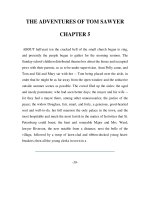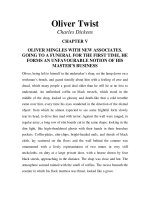IB minitest 5 Chapter5 PoliticalForces
Bạn đang xem bản rút gọn của tài liệu. Xem và tải ngay bản đầy đủ của tài liệu tại đây (64.78 KB, 3 trang )
InternationalBusiness
Chapter5
PoliticalForces
Task1:Choosethebestanswer
1.Whencommuniststakeoverapreviouslynoncommunistcountry:
A)thegovernmentwilltakeoverprivatebusiness.
B)paymentforprivatepropertyisnegotiated.
C)foreignarbitratorsdeterminefairamountsofpayment.
D)onlythepublicutilityassetsareseized.
2.Whichamongthefollowingisnotacharacteristicofgovernmentsofdeveloping
countries?
A)Theyoftenprofessandpracticesomedegreeofsocialism.
B)Theytypicallyownandcontrolmostofthefactorsofproduction.
C)Theywouldideallynotseekcapitalinvestment.
D)Theyexperienceshortagesofcapital,technologyandskilledmanagement
andlabor.
3.Privatizationincludesallofthefollowingexcept:
A)ownershiptransferfrompublictoprivatesector.
B)contractedoutservices.
C)state-ownedplantsleasedtoprivateentities.
D)governmentagenciescompletelyfundingprivateownedcompanies.
4.Countryriskassessment
A)isaserviceprovidedtobusinessbycountrygovernments.
B)helpscompaniesdecidewheretoconductbusinessandforwhichrisksto
insure.
C)isthefocusofeconometricians.
D)indicatesthatthereisverylittleregulationofbusinessesandprofessions.
5.Inanumberofways,thepoliticalclimateofthecountryinwhichabusiness
operatesisasimportantasacountry's:
A)topography.
B)naturalresources.
C)meteorologicalclimate.
D)alloftheabove.
6.Itisthe________________doctrinethatthegovernmentshouldownallthemajor
factorsofproduction.
A)communist
B)socialist
C)democratic
D)nationalism
7.Thegovernmentseizureofthepropertywithinitsbordersownedbyforeigners,
followed by prompt, adequate, and effective compensation paid to the former
ownersiscalled:
A)nationalization.
B)expropriation.
C)confiscation.
D)privatization.
8.Underidealcapitalism,governmentwouldberestrictedtothosefunctionsthat
theprivatesectorcannotperformsuchas:
A)nationaldefense.
B)police,fireandotherpublicservices.
C)government-to-governmentinternationalrelations.
D)alloftheabove.
9.Socialismadvocatesgovernmentownershiporcontrolofthebasicmeansof
production,distribution,andexchange.Asactuallypracticed,socialism:
A)ispresentonlyintheEuropeancountries.
B)resultsinthenationalizationofallbusinesses.
C)variesconsiderablyfromcountrytocountry.
D)israpidlybeingreplacedbycapitalism.
10.Governmentownershipofthefactorsofproduction:
A)ispresentonlyincommunistcountries.
B)ispresentonlyinsocialistcountries.
C)varieswidelyfromcountrytocountry.
D)both"a"and"b".
11. Where government owned companies compete with privately owned
companies, the private companies sometimes complain that government owned
companies:
A)operateundermonopolisticconditions.
B)areabletogetinterest-freefinancing.
C)arealwaysawardedgovernmentcontracts.
D)getexportassistance.
12.Theacknowledgedleaderoftheprivatizationmovementwas:
A)MargaretThatcher.
B)BillClinton.
C)RonaldReagan.
D)TonyBlair.
13.Inthepreviouslycommunistgovernment-controlledeconomiesofCentraland
EasternEurope,thechangetomarketeconomiesisreferredtoas:
A)capitalism.
B)sociocapitalism.
C)transition.
D)reconstruction.
14.Nationalismisadevotionto:
A)one'sownnation.
B)thepoliticalandeconomicinterestsoraspirationsofone'snation.
C)theculturalandsocialtraditionsofone'snation.
D)alloftheabove.
15.Ahistoricfunctionofgovernmenthasbeentheprotectionofthe__________within
itsgeographicareaofcontrol.
A)economicactivity
B)culture
C)legalstructure
D)politicalpower
For the military and
neglected production of
Task2:Decidethestatementsaretrue(T)orfalse(F)
consumer goods
1.OnereasonforthecollapseoftheUSSRwasthatitconcentrateditsresourceson
productionofconsumergoodsandneglectedproductionforthemilitary.
2. Politically, in the U.S., the term "conservative," is a person who wishes to
minimizegovernmentactivities.
3.Anadvantagestate-ownedcompanieshaveoverprivatelyownedbusinesscomes
intheformofdirectsubsidies,paymentsbythegovernmenttotheircompanies.
4.Privatizationofindustrialandcommercialcompaniesimprovesthesolvencyand
stabilityofthebankingsectorinthosecountries.
Task3:Answerthequestions
1. What is ideology? Why is it important to international business?
2. Why does business fear sudden changes in government policies?
Business fears sudden changes in government policies because firms need to plan. Firms need to have
assumptions on which they can base their planning instead of simply not knowing what will happen.
For example, imagine that you owned an oil company that wanted to invest in Venezuela. When you
consider doing this, you would have to understand that you would be putting a lot of money into your
investment. Now consider the government of that country. At any moment, Hugo Chavez might change
the laws and either take your equipment or reduce the amount of profit you are allowed to make. You
would fear this because your ability to do business might be radically altered without any warning.
This is an extreme case, of course. But the same thing can happen on a much smaller scale even in
countries that are more stable. Imagine if you were investing in wind power in the US. You would fear
what might happen if Republicans come to power and suddenly cut subsidies to wind power.
Government decisions can have a huge impact on the business environment. Firms need to know that
their environment will remain stable so they can plan. Therefore, they fear sudden changes in policy that
will upset their plans and can cause them to lose money.









